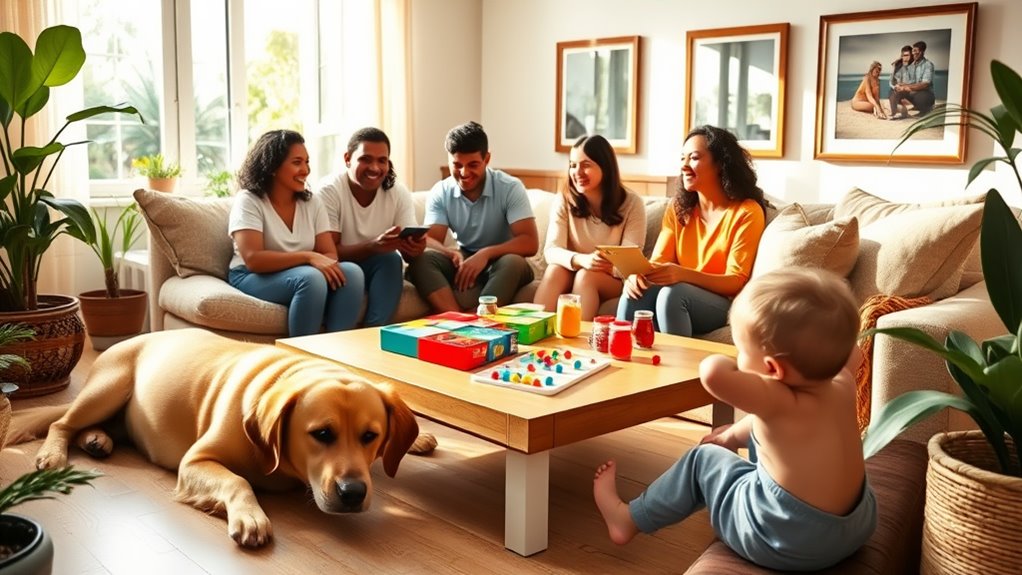Family Dynamics Conversations That Heal Relationships!
Healing your family relationships starts with understanding the dynamics at play. Open, honest communication is key. Create a calm environment where everyone feels safe to share their thoughts. Use “I” statements to express your feelings without placing blame. Listen actively; show empathy by reflecting back what you hear and asking open-ended questions. It’s essential to validate each other’s emotions, even if you don’t agree. Remember, healing takes time and patience, but your efforts can lead to a deeper connection and lasting understanding. If you’re curious about strategies to foster this healing, there’s so much more to explore.
Key Takeaways
- Establish a calm and distraction-free environment to foster open dialogue during healing conversations.
- Use “I” statements to share feelings without assigning blame, promoting understanding and connection.
- Practice active listening by reflecting emotions and validating feelings, ensuring everyone feels heard.
- Encourage full expression of thoughts without interruptions, allowing space for deeper sharing and vulnerability.
- Engage in shared experiences that strengthen emotional ties and create lasting connections among family members.
Understanding Family Dynamics
Family dynamics can feel like a complex web, intertwining emotions, roles, and relationships that shape our daily lives. Understanding these dynamics is key to mastering your interactions within the family. Each family member typically takes on specific roles—be it the caretaker, the rebel, or the peacemaker. Recognizing these roles helps you see how they influence behavior and emotional responses.
You might find that certain situations trigger strong emotional reactions, not just in you but in others as well. These emotional triggers often stem from past experiences, affecting how family members communicate and resolve conflicts. By identifying these triggers, you can create a more empathetic atmosphere where everyone feels heard and understood.
Consider how your actions and words impact family dynamics. When you respond thoughtfully to emotional triggers rather than react impulsively, you pave the way for healthier interactions. It’s important to remember that understanding family roles and emotional triggers doesn’t just foster tolerance; it promotes growth and healing. By delving deep into these dynamics, you empower yourself and your loved ones to nurture more fulfilling relationships.
The Importance of Open Communication
Open communication is the cornerstone of healthy relationships, fostering an environment where everyone feels valued and understood. When you engage openly, you create space for emotional expression, allowing feelings to surface and be acknowledged. This practice not only strengthens bonds but also enhances conflict resolution.
Imagine facing a disagreement; without open dialogue, misunderstandings can spiral into resentment. But when you approach conflicts with a willingness to listen and share perspectives, you pave the way for solutions that honor everyone’s feelings. You’re not just resolving conflicts; you’re building trust and mutual respect.
Moreover, open communication encourages vulnerability, which is essential for deep connections. When you express your emotions honestly, you invite others to do the same, transforming your family dynamic. This exchange fosters empathy, enabling each member to see the world through another’s eyes.
Strategies for Healing Conversations
Creating an environment where healing conversations can take place requires intentionality and care. Start by setting a calm atmosphere, free from distractions. This isn’t just about the physical space; it’s about creating a mental space where everyone feels safe to express themselves.
When conflicts arise, focus on conflict resolution by addressing the issue at hand without attacking the person. Use “I” statements to articulate your feelings and perspective. For instance, say “I feel hurt when…” instead of “You always…”. This shift fosters understanding rather than defensiveness.
Emotional validation is crucial. Acknowledge the feelings of others, even if you don’t agree with their perspective. You might say, “I understand why you feel that way,” which opens the door for deeper dialogue.
Encourage each family member to share their thoughts and feelings fully. Avoid interrupting or dismissing what they say. Instead, show genuine interest in their experiences—this builds trust and lays the foundation for healing.
Finally, be patient. Healing conversations take time, and practice will help you master these strategies. With commitment, you’ll cultivate healthier, more resilient family dynamics.
Listening With Empathy
Listening with empathy is about truly tuning in to what someone is saying while being present in the moment. When you practice active listening, you not only hear the words but also connect with the emotions behind them. This connection fosters emotional validation, letting the speaker know their feelings matter.
To enhance your empathetic listening skills, consider these strategies:
- Maintain Eye Contact: Show you’re engaged and interested in what’s being shared.
- Reflect Back: Paraphrase what you’ve heard to ensure understanding and show you’re listening.
- Avoid Interrupting: Let the speaker finish their thoughts before you respond, allowing space for their emotions.
- Ask Open-Ended Questions: Encourage deeper sharing by asking questions that invite more than yes-or-no answers.
Building Lasting Understanding
Building lasting understanding in family dynamics requires a commitment to nurturing connections that transcend surface-level interactions. You can achieve this by actively engaging in shared experiences that foster deeper emotional ties. Whether it’s a family game night, a shared hobby, or simply cooking together, these moments allow you to connect on a personal level, creating a foundation for understanding.
As you navigate these interactions, it’s crucial to respect emotional boundaries. Acknowledging each family member’s feelings fosters an environment where everyone feels safe to express themselves. By doing so, you invite open dialogue, encouraging vulnerability and honesty. This not only strengthens your relationships but also helps you recognize differing perspectives within the family.
Frequently Asked Questions
How Can I Start a Difficult Conversation With My Family?
To start a difficult conversation, approach with emotional honesty. Use active listening to show you value their thoughts. Set a calm tone, express your feelings, and invite openness—this fosters understanding and strengthens your connection.
What if My Family Refuses to Engage in Healing Conversations?
What if your family won’t engage? Setting boundaries becomes crucial. Without healthy dialogue, emotional distance grows. You can still prioritize your well-being, fostering self-growth and understanding, even if others aren’t ready to join you.
Are There Specific Phrases That Encourage Open Dialogue?
To encourage open dialogue, try phrases like, “I hear you,” or “That sounds tough.” Focus on active listening and provide empathetic responses. This approach fosters trust and invites deeper conversations, enhancing understanding and connection.
How Can I Maintain My Calm During Heated Discussions?
To maintain your calm during heated discussions, practice active listening and focus on emotional regulation. Breathe deeply, acknowledge your feelings, and respond thoughtfully. This approach fosters understanding and encourages a more constructive dialogue.
What Role Does Forgiveness Play in Healing Family Dynamics?
Forgiveness plays a crucial role in healing journeys. It clears emotional burdens, fosters understanding, and opens pathways for genuine connection. Embracing forgiveness benefits you and others, creating a foundation for healthier, more resilient relationships.




